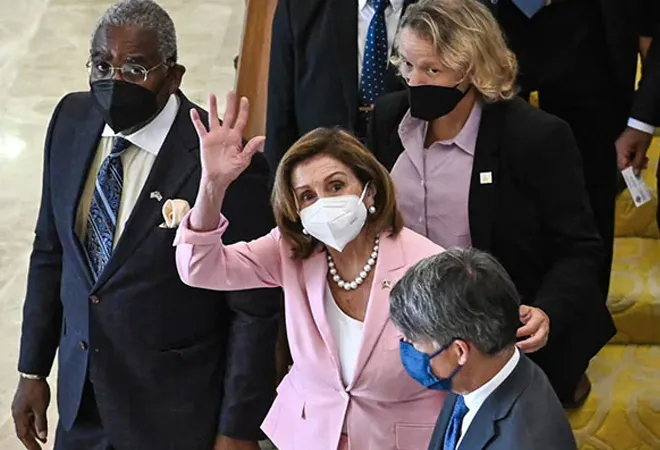
One of the defining moments of the 20
th century was US President Richard Nixon’s trip to Beijing in 1972. This marked an important realignment in the geopolitics of the region and eventually paved the path for China’s rise. That unprecedented American foreign policy initiative led to the coining of a new phrase ‘Nixon to China’. Now exactly, half a century later a new idiom ‘Pelosi to Taiwan’ could replace the old one.
Pelosi’s trip to Taiwan has exposed China’s double-talk and Chinese President Xi Jinping’s strategic overreach.
Nixon’s visit had tremendous significance since it signalled a thaw in China–United States (US) relations. The Shanghai Communique declared that the normalisation of relations between the People’s Republic and the US was in the interest of global peace and would have a bearing on regional security. Pelosi’s trip to Taiwan has exposed China’s double-talk and Chinese President Xi Jinping’s strategic overreach. It has highlighted the pitfalls of China weaponising nationalism.
To start with, US House Speaker Nancy Pelosi’s visit did not seem to have begun on a propitious note. Initially, there was no confirmation that Pelosi who is second in line to the US presidency, would indeed visit Taiwan. US President Joe Biden’s statement that the US military did not approve of Pelosi’s sojourn, indicated to the Chinese leadership that the American political elite was perhaps not on the same page on the issue of Taiwan. This supposed dissonance China to up the ante about Pelosi’s trip. During the phone call between President Xi Jinping and Biden on 28 July, the former criticized the American foreign policy approach of treating China as a
rival and decoupling with China. However on the issue of Taiwan which China defines as its ‘core interest’, Xi issued a
stern warning to Biden that “those who play with fire would perish by it”, indicating that Pelosi breaching the Taiwan ‘red line’ would certainly draw a military response. Taking a cue from the rhetoric emanating from the very top, state-affiliated media influencers resorted to sabre-rattling, threatening that Pelosi’s jet could be
shot down even as Chinese diplomats referred to taking “countermeasures”, without spelling out what was in store but making sure that it would be menacing.
During the phone call between President Xi Jinping and Biden on 28 July, the former criticized the American foreign policy approach of treating China as a rival and decoupling with China.
China’s response after the Pelosi visit was a combination of leveraging its economic muscle and unleashing “targeted military operations”. China suspended imports of seafood and fruits from Taiwan, adding to the list of nearly
1,000 items that have been proscribed since cross-straits relations deteriorated over the last few years. War games close to Taiwan have begun; China has resorted to missile strikes and aerial incursions into Taiwanese airspace. Pelosi and her kin will face sanctions by Beijing. Another noteworthy point is that the economic measures seem to be aimed at the farming community in parts of southern Taiwan, where Taiwan President Tsai Ing-wen’s Democratic Progressive Party has a support base. The fact that the People’s Liberation Army did not meddle with Pelosi’s flights to and from the island, and that China began its military drills after the US politician left, indicates that This may have let down the large nationalistic constituency whom Xi promised that he could reunify Taiwan by force.
Mainland’s nationalists could draw parallels between America and Erstwhile Soviet Union’s confrontation in the last decade. While USSR had occupied the Baltic Republics of Estonia, Latvia, and Lithuania in 1940, but despite their incorporation into the Soviet Union not being recognised by the West, America desisted from undertaking any adventurism regarding the disputed regions even in the erstwhile superpower’s declining years. China’s ideological peer had the temerity to shoot down a South Korean civilian jet that had accidentally transgressed in prohibited Soviet airspace in 1983. Anticipating such clamour in its nationalist ranks in the wake of Pelosi’s trip, the Chinese foreign ministry called on the people to be “
rational patriots” and have conviction in Beijing’s ability to protect China’s sovereignty and territorial integrity.
China suspended imports of seafood and fruits from Taiwan, adding to the list of nearly 1,000 items that have been proscribed since cross-straits relations deteriorated over the last few years.
A Janus-faced China
This brings us to the issue of Xi’s double-talk and strategic overreach. An ascendant China, especially under Xi, went back on its treaty commitments to the United Kingdom concerning Hong Kong. At the height of the pandemic, China amassed troops in the Ladakh region in violation of border agreements that Xi’s predecessor signed. Yet in his talks with Biden in July, Xi asserted China’s
territorial integrity, and that America must abide by the People’s Republic’s notion that both sides of the Taiwan Strait belong to China, which is enshrined in the China-US joint communiques. During negotiations in 1972 between Nixon and Chinese leaders, America had affirmed this position on the caveat that there be a peaceful settlement of the Taiwan issue by the Chinese themselves. However, in 2020, the Chinese elite dropped the word ‘peaceful’ in its pursuit of reunification, and fighter jets and navy vessels began approaching the island on drills. Simply put, China can break its pledges, however, the other party must keep their word. An ascendant China, especially under Xi, sought to bring territorial disputes to the front burner and chose to dictate the behaviour of democratic nations. In 2021, China objected to the visit of Vice President Venkaiah Naidu to Arunachal Pradesh. Academic Perry Link had likened China’s behaviour to that of an anaconda in a chandelier, wherein mere sight of the reptile affected a change in its adversary’s behaviour. ‘Pelosi to Taiwan’ has breached China’s red line, and defanged the anaconda. Importantly, it signals the blowback against China threatening democratic nations, since it comes at a time when democracies are increasingly feeling pressure from revanchist autocrats like Vladimir Putin and Xi. Pelosi left Taiwan after upholding its democratic credentials and pledging support to the island much to the chagrin of China. More importantly, it has underlined China’s duplicity, where on one hand it talks about the People’s Republic’s territorial integrity, on the other hand, it aids Putin in trampling on Ukraine’s.
An ascendant China, especially under Xi, sought to bring territorial disputes to the front burner and chose to dictate the behaviour of democratic nations.
‘Pelosi to Taiwan’ also highlights the issue of China weaponising nationalism. The Chinese Communist Party has been tapping into nationalistic sentiment to rally domestic support, but the rising tide among mainland nationalists may now make any peaceful resolution of the issue difficult. This constituency may expect nothing short of seeing China forcibly reunify Taiwan. Yet doing so ahead of the crucial 20th Party Congress is fraught with risks for Xi, who expects an unprecedented third term, since any setbacks on the military front may put paid to his prospects of reassuming power. Besides Xi ought to remember that it was adventurism on the issue of the island of Cuba in 1962 that led to the eventual ouster of Soviet leader Nikita Khrushchev.
The views expressed above belong to the author(s). ORF research and analyses now available on Telegram! Click here to access our curated content — blogs, longforms and interviews.



 One of the defining moments of the 20th century was US President Richard Nixon’s trip to Beijing in 1972. This marked an important realignment in the geopolitics of the region and eventually paved the path for China’s rise. That unprecedented American foreign policy initiative led to the coining of a new phrase ‘Nixon to China’. Now exactly, half a century later a new idiom ‘Pelosi to Taiwan’ could replace the old one.
One of the defining moments of the 20th century was US President Richard Nixon’s trip to Beijing in 1972. This marked an important realignment in the geopolitics of the region and eventually paved the path for China’s rise. That unprecedented American foreign policy initiative led to the coining of a new phrase ‘Nixon to China’. Now exactly, half a century later a new idiom ‘Pelosi to Taiwan’ could replace the old one.
 PREV
PREV


